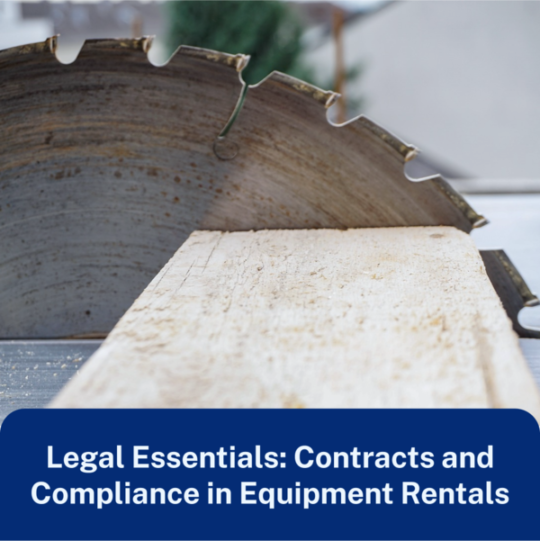Equipment rentals are a common practice, catering to businesses and individuals in need of various tools, machinery, and assets for specific tasks. From construction companies leasing heavy machinery to farming suppliers renting tractors, equipment rentals are an integral part of many industries. However, beneath these seemingly simple transactions lie crucial legal considerations, primarily revolving around rental contracts and compliance with regulations. Understanding these legal essentials is imperative for both parties engaged in equipment rental agreements.
The Foundation: Rental Contracts
At the core of any equipment rental is the rental contract, also known as an equipment rental agreement. This legal document forms the bedrock of the entire rental process, delineating the terms and conditions governing the rental arrangement. Its purpose is to ensure that both lessors and lessees are in complete agreement regarding their respective rights, obligations, and responsibilities.
One of the key elements of a robust equipment rental contract is the clear identification of the parties involved. This includes specifying the lessor, the entity or individual providing the equipment, and the lessee, the entity or individual renting the equipment. Such identification is vital to establish the roles and responsibilities of each party from the outset.
A detailed description of the equipment being rented is also a fundamental aspect of the contract. This description should include specific details such as make, model, serial number, and any unique identifiers that can help prevent confusion or disputes about the condition of the equipment before and after the rental period.
The rental duration is another critical element. Clearly defining the start and end dates of the rental period eliminates any ambiguity about the duration of the agreement. Additionally, for longer-term rentals, the contract should include provisions for renewal or early termination.
Financial matters should be detailed in the contract as well. This includes outlining the rental fee, specifying the amount, frequency of payment (e.g., weekly, monthly), and the due date. The method of payment, whether it’s cash, check, credit card, or another form, should also be specified.
In many equipment rental agreements, lessees are required to provide a security deposit. This deposit serves as a form of insurance against damage, loss, or other breaches of the contract terms.
Responsibility for equipment maintenance and repairs should be clearly established in the contract. Typically, routine maintenance is the lessor’s responsibility, but the lessee is expected to return the equipment in the same condition it was received.
The contract should also address liability and insurance. It is essential to define the liability of each party in the event of damage, loss, or injury related to the equipment. Additionally, both parties should have adequate insurance coverage as equipment-related accidents can be costly.
To facilitate dispute resolution, it’s wise to include a clause that outlines the process for resolving conflicts that may arise during the rental period. This can help avoid costly and time-consuming legal battles. Furthermore, the contract should specify the conditions under which the agreement can be terminated and outline the process for returning the equipment. Finally, a statement that both parties will adhere to all relevant laws and regulations should be included to ensure full compliance with legal requirements.
Compliance with Regulations
In addition to the terms outlined in the rental contract, businesses and individuals engaging in equipment rentals must also adhere to various regulations and legal requirements.
Safety regulations are particularly significant, as the type of equipment being rented may be subject to safety standards imposed by local, state, or federal authorities. For instance, heavy machinery rentals often require adherence to specific safety guidelines to prevent accidents and injuries.
Environmental regulations may come into play, especially for equipment that generates emissions or handles hazardous materials. This may require additional permits and strict compliance with environmental laws.
Ensuring the necessary licenses and permits are in place is crucial. Equipment rental businesses should hold the requisite licenses and permits to operate legally. Lessees should also be aware of any special permits they may need to use specific equipment.
Taxation laws can vary depending on the location and nature of the rental. Awareness of tax implications, such as sales tax or use tax, is vital, and they should be properly accounted for in the rental agreement.
Lastly, both lessors and lessees should have adequate insurance coverage for the equipment. This involves understanding the type and extent of insurance needed to protect against liability, property damage, or theft.
Final Thoughts
Equipment rentals are a practical solution for a wide range of needs, but they should always be conducted within the bounds of the law. Rental contracts serve as the foundation for a successful and legally compliant transaction. By outlining the terms and conditions, both parties can protect their interests and avoid disputes.
Compliance with regulations is equally vital to ensure that the rental process meets all legal requirements. Adherence to safety, environmental, and tax regulations, among others, helps prevent potential legal issues and ensures that the equipment rental is conducted within the framework of the law.
Before reading our equipment rental guide, it’s advisable to seek legal counsel, especially for complex or high-value rentals, to ensure that your rental contract is robust, legally sound, and in full compliance with all relevant regulations. With a solid contract and a commitment to compliance, equipment rentals can be a smooth and mutually beneficial business arrangement for all parties involved.

